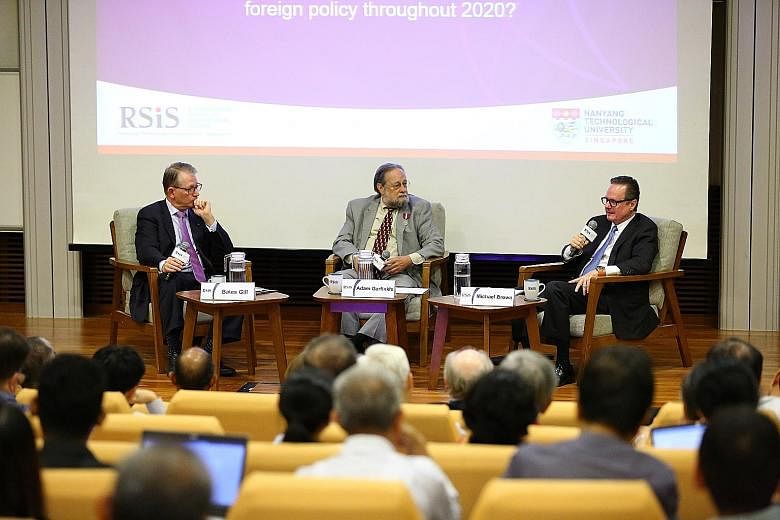The United States' foreign policy decisions, in the run-up to the US presidential elections on Nov 3, might well leave the world in a bit of a mess and should President Donald Trump return to the White House, the world order could become dire in the coming years, veteran observers of US foreign policy said at a forum here.
Washington's recent actions point to a build-up of a nuclear crisis with Iran and North Korea, and a return to the great power competition between the US, Russia and China. But US allies - especially in East Asia - are no longer assured of America's security guarantees.
The consequences of policy decisions by the Trump administration on controlling climate change could well be disastrous as well.
Professor Michael Brown and Dr Bates Gill expressed these views at the S. Rajaratnam School of International Studies (RSIS) Distinguished Public Dialogue on US Foreign Policy in a Time of Turmoil at Home and Abroad, held at NTU @ one-north on Thursday.
Prof Brown is professor of international affairs and political science at George Washington University's Elliott School of International Affairs. He was the school's former dean.
Dr Gill is professor of Asia-Pacific security studies, at Sydney's Macquarie University, and the former director of the Stockholm International Peace Research Institute.
Both speakers are on the board of governors of RSIS.
The session was moderated by Dr Adam Garfinkle, an RSIS distinguished visiting fellow, and the founding editor of The American Interest, a public policy magazine.
The dialogue was held at a time of growing interest in American foreign policy after a US air strike left Iranian general Qassem Soleimani dead and sparked tensions in the Middle East.
Teheran retaliated this week with strikes on Iraqi bases housing US troops.
With the American move on Iran being seen as a bid by the Trump administration to deflect attention from an impeachment trial due to come up at the US Senate, questions abounded on the likely consequences of domestic policies on US foreign policy in an election year.
Said Dr Gill: "The impact of US politics on foreign policy will not be pretty... (It) will be a bit of a mess.
"We may well see more of what we have seen in the past week, and that is a president who sees in foreign activity an opportunity to deflect the attention that is being paid to the issues at home."
Prof Brown said that the thing to watch out for will be whether Iran kicks out International Atomic Energy Agency inspectors. If it does so, it will mean Iran is moving towards a high level of enrichment and speeding up efforts to build nuclear weapon capability and if that happens, it will be a moment of crisis, he said.
Prof Brown added that Mr Trump had said he will not allow Iran to have nuclear weapon capability, which could mean a substantial attack on the country.
"If he (Mr Trump) wins the elections in 2020, the prospects for world order over the next four or five years are dire. My view is that it will be a new world order, a worse world order... one can't really call it a world order," said Prof Brown. "There will be alliances and trade relations and a world with spheres of influence and great power competition where small-and medium-sized countries will have to work out things for themselves."
There could be a huge impact on controlling climate change as well.
People recognise the importance of making a difference to climate change in the next 10 years but if five of those are under the Trump administration, then that will be "another area where the world order will be shaken, very substantially", concluded Prof Brown.


